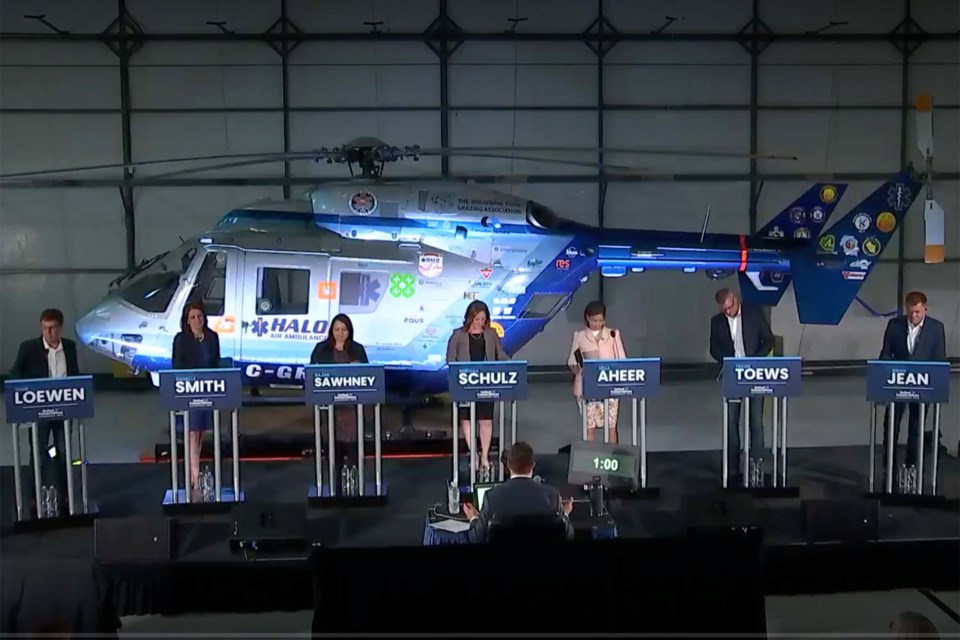Technical difficulties meant there were several disruptions to the live-streamed feed of the first official United Conservative Party (UCP) leadership debate last week.
The two-hour debate was held on July 27 at the HALO Air Ambulance Hangar in Medicine Hat, and featured all seven leadership hopefuls answering questions related to their thoughts on the future of the UCP and how a government led by them would operate, including their thoughts on equalization and Alberta’s place in the confederacy.
Candidates for premier include: former UCP cabinet ministers Leela Aheer, Rajan Sawhney, Rebecca Schulz, and Travis Toews; two former Wildrose leaders Danielle Smith and Brian Jean; and independent Todd Loewen, who was ousted by the UCP last year.
Former Calgary Councillor Jeff Davidson moderated the event, and questions posed to those vying for a seat in the premier’s chair were submitted by UCP caucus members from across the province.
There were seven questions in total, and each was posed first to a randomly-drawn candidate who then had the opportunity to debate a person of their choosing. Other candidates had the option of weighing in for 45 seconds.
One of the “hot topics” of the evening addressed the issue of equalization.
Equalization was an issue from the referendum vote held during last fall's municipal elections. The question asked if the government’s commitment to the principle of making equalization payments should be removed from the constitution, with 61.7 per cent of Albertan voters answering yes.
During the debate, Schulz was the first to be asked about how she as leader would address issues such as equalization payments with the federal government in specific and tangible measures.
Schulz said she is the only candidate who has successfully negotiated with the federal government over day-care funding, and the provincial approach so far has been to write letters and angry “tweets.”
“I would rather go at it as an army of other provinces than going at it alone,” she said.
Schulz chose to debate Smith over the topic.
Smith gave Schulz credit for the negotiations, but said the province always loses when we go up against Ottawa.
“I don't look at that as a win — implementing Justin Trudeau's socialist daycare system and squeezing out the private day-care operators that won't vote for us — looks to me like a step backwards,” Smith said.
Aheer, who had 45 seconds to address the topic, took aim at Smith’s proposed Sovereignty Act.
On June 15, Smith said she would implement the Sovereignty Act on day one as premier. The act would allow the province to refuse to enforce federal laws or court decisions the province feels impede on provincial rights or threaten provincial interests.
“I just wanted to say to Ms. Smith, you've mentioned several sections out of the constitution that you think that we can forward our agenda on which I completely agree with, but then that would render your Sovereignty Act completely redundant,” Aheer said.
Aheer said it is possible to work within the constitution to negotiate and win.
Toews also took aim at Smith's proposed Sovereignty Act.
“Here's the reality: it would be great to just wish away all our problems with this thing called the sovereignty act … I've concluded with this federal government; we can't negotiate with them. We won't win if we just simply negotiate, but we'll win if we're strategic. My approach with Ottawa is to be assertive and strategic,” he said, without giving specifics on how he would strategize.
Loewen said confederation is broken, and it’s time we act as a province.
“We need to start saying no to Ottawa. We have things like a pension plan and Alberta constitution that we can do right now,” he said.
Sawhney said Alberta must fight back against Ottawa, but it must be done without being risky and hardheaded.
“Justin Trudeau relies on confrontation, polarization wedging, and division, and at least one of my opponents here today thinks we should respond just like Trudeau. I don't think that way. I'm actually focused on solving real world problems,” Sawhney said.
Jean said he brought the idea of the equalization referendum forth when he was leader of the Wildrose Party.
“We can force Canada to the constitutional negotiation table. All these sections of the constitution — try section 46 — that's where you get legal notice to the rest of the country that you are not happy with the situation because you have received a mandate from the people. Without a mandate from the people, it cannot happen,” he said.
A version of the debate without technical difficulties is available online at: https://www.unitedconservative.ca/leadership/
The next debate is in Edmonton at the Citadel's Maclab Theatre on Aug. 30 at 6 p.m. The event will also be live-streamed.




